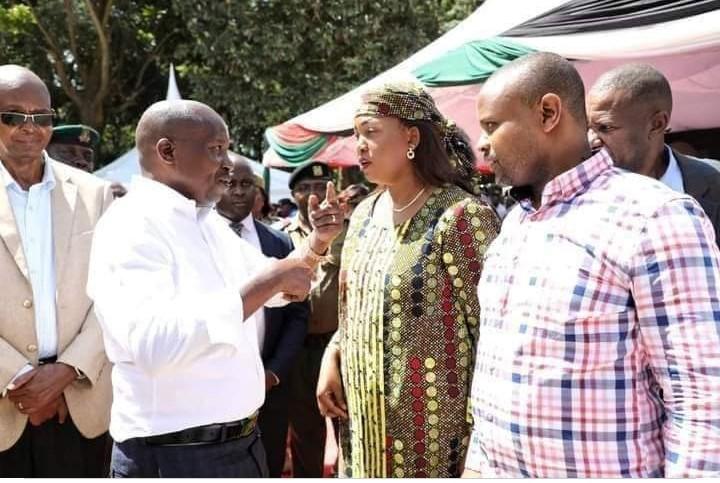
5 minute read
Stop playing these unga politics, Kenyans are suffering
Food shortage has been a major cause of uprisings and revolutions all over the world.
It might be bread, rice or in our case the staple ugali.
Advertisement
In the recent past we have seen opposition leaders and activists leading street demonstrations over the rising cost of living occasioned by the soaring prices of basic commodities especially unga. It took Sri Lanka just this kind of scenario to oust the government, with disenchantment demonstrators taking over the presidential residence feasting and enjoying creature comforts they could hardly afford.
The Sri Lanka uprising was not without precedent.
With rice being the staple food for most Sri Lankans, the government shot itself in the foot by banning the use of chemical fertilizers in preference for organic ones.
This erratic policy caught many rice farmers unawares and in so doing most abandoned rice farming, leading to a shortage of this staple.
The last straw came when the government resorted to cheap rice imports, further impoverishing the local farmers.
As they say, the rest is history.
Coming closer home, our staple ugali has been the most common meal consumed from rural to urban areas and its foolhardy for any leader to delude themselves that Kenyans can change their eating habits and feed on other foodstuffs.
Granted, in the days of yore there were plenty of tubers and grains that people could supplement their food reserves with.
Not anymore. Actually getting tubers like potatoes, cassava and arrow roots especially in the urban areas is a wild dream and if available, the price is so high compared to maize flour.
That’s why the government must take the bull by the horns and address the unga price issue before the bubble bursts.
Many Kenyans would not mind whether the maize from which they get their flour is produced locally or imported. What most are yearning for is food of reasonable quality and price.
However, we should not misconstrue this to mean that our farmers should be left at wits end.
In fact right now the dialogue should be whether we have enough maize stocks and if not, how much we can import to fill the deficit.
Kenya is well known for harbouring crafty cartels who will foment artificial shortages of commodities so that they can make a kill through cheap imports. The maize sector is one key sector that has been the milk cow for these cartels and it’s upon the leaders concerned to ensure that they don’t rear their ugly head in the current food crisis.
Secondly though ours is a free market economy the local maize farmers also need to be motivated by getting reasonable prices for their farm produce. Right now chances are there are farmers hoarding maize stocks in regions such as Rift Valley due to the poor prices being offered by the government while in other parts of the country, people are going hungry.
This should not be so. It’s high time the government takes the bull by the horns before push comes to shove.
Address corruption, inefficiency and political interference to bring Tavevo back to profitability

When the Taita-Taveta Water & Sewerage Company (Tavevo) was contracted in 2006 to take over water services previously being maintained and operated by the Voi Municipal council, many heaved a sigh of relief believing that problems like inflated bills and poor water supply would be a thing of the past, more so for the fast growing Voi town and its environs.
Covering an area of 150 square kilometres with a population of more than 80,000 inhabitants, Tavevo had its job cut out for it.
Though the terms leadership and democracy have varied interpretations in different countries in the world, it finally boils down to fair representation of the people at various levels.
In any country the masses have hopes and aspirations which they feel are best represented by leaders of their choice, with the political pecking order including kings, presidents, prime ministers all the way down to civic leaders.
Most of these positions require elections, which give people an opportunity to chose the leaders they want.
It goes without saying that for a country to be said to be truly democratic its citizens must have the opportunity to choose their representatives through elections that are free and fair.
Critical development efforts cannot succeed without a legitimate and democratically elected government that is responsive and accountable to its citizens.
However in Kenya and other countries, a trend is emerging where elections are being manipulated to favour certain politicians based on tribal, racial or class profiling, thereby raising serious questions on their validity in representing the peoples' will.
Though there are laws and regulations guarding the conduct of elections, these are disregarded in most instances, with the political contests being viewed as a matter of life and death by some.
In Kenya the trend has not being any different.
Election malpractices still reign supreme, the most prominent in recent history being the bungle 1988 “mlolongo”(queue) voting which were so rigged that our democracy was put to a severe test.

Though we did away with the queue voting system in favour of the secret ballot, there still remains a lot to be done to make our elections free fair and credible.

Sometimes gullible voters are swayed with cheap propaganda by shrewd politicians and cast their votes to the wrong leaders, only to end up lamenting for a period of five years.
Secondly, and that’s the gist of this article, there is emerging a trend in the recent years where voters no longer cast their votes to choose a suitable leader, but to “punish” the incumbent.
That’s the most foolhardy kind of political decision to make because the key tenet of democracy is to elect leaders who can offer the right representation and not to “punish” another politician.
After all, once the “punished” leaders vacates office, the gullible voters wake up to the reality that whoever they chose is not any better.
This creates a vicious cycle where in the coming polls, another leader is voted in to “punish” the current one who was also elected to “punish” their predecessor.
Such a scenario requires sobriety and the requisite civic education to create awareness in the voters on how to conduct polls and the importance of electing leaders based on their capability.
Gullible voters who are easy to sway and mislead will always make wrong choices.
At the end of the day ,these wrong decisions and choices affect us all, those who voted wisely and those who did not.
However, as many will attest, the company’s performance has been nothing but dismal. First, response to distress calls has been poor and many residents are forced to look for alternative means to meet their urgent water needs.
The issue of inflated bills not commensurate with water supplies still continues to anger many consumers.
In fact beneath these problems are underlying issues which came to the fore recently when the auditor general exposed the rot bedeviling the water firm.

From the disappearance of more than Sh100m and debts of Sh545m, the company is virtually on its deathbed and can only operate on funds from donors.
A company working on negative capital of hundreds of millions yet consumers pay hefty bills every month is a big letdown for the county.
Among the key issues that has stuck out like a sore thumb is the issue of unaccounted for water(UFW).
This is water that is lost through illegal connections and to a smaller extent leaks and bursts.
For instance audited reports for the year 2018 indicate that unaccounted for water stood at 2.9 million cubic metres (approximately 52 per cent) which is way above the maximum allowable loss of 25 per cent stipulated by the Water Services Regulatory Board (WASREB).
This led to a loss of more than Sh97m.
On the other hand the issue of political interference in the hiring of staff as well as the constitution of the water company board remains a thorny one.
Currently, there is a contest between the former MD who was a crony of the former governor and the acting MD who is the appointee of the current governor.
The former MD went to court and obtained an order reinstating him till the matter was heard and determined.
How a water firm can have two MDs remains a conundrum.
At the end of it all, it’s the residents who continue suffering poor service delivery despite paying hefty bills every month. ..et






